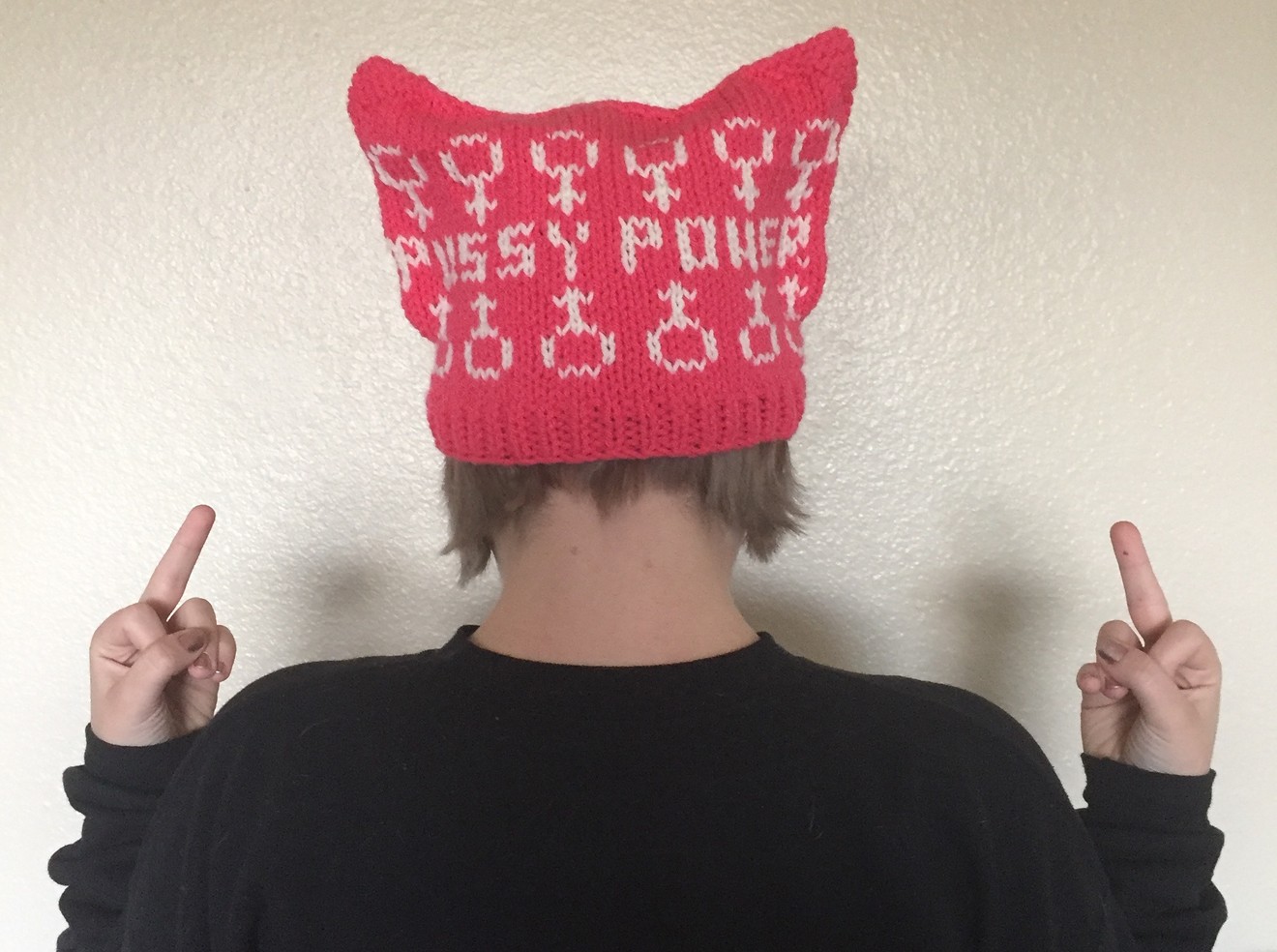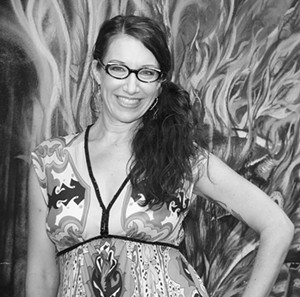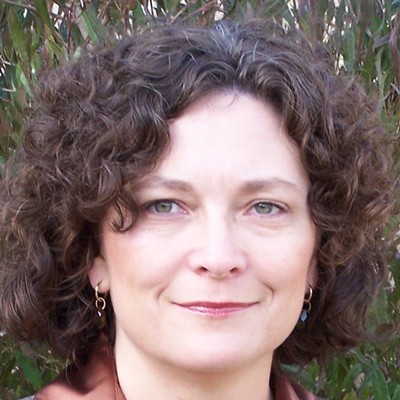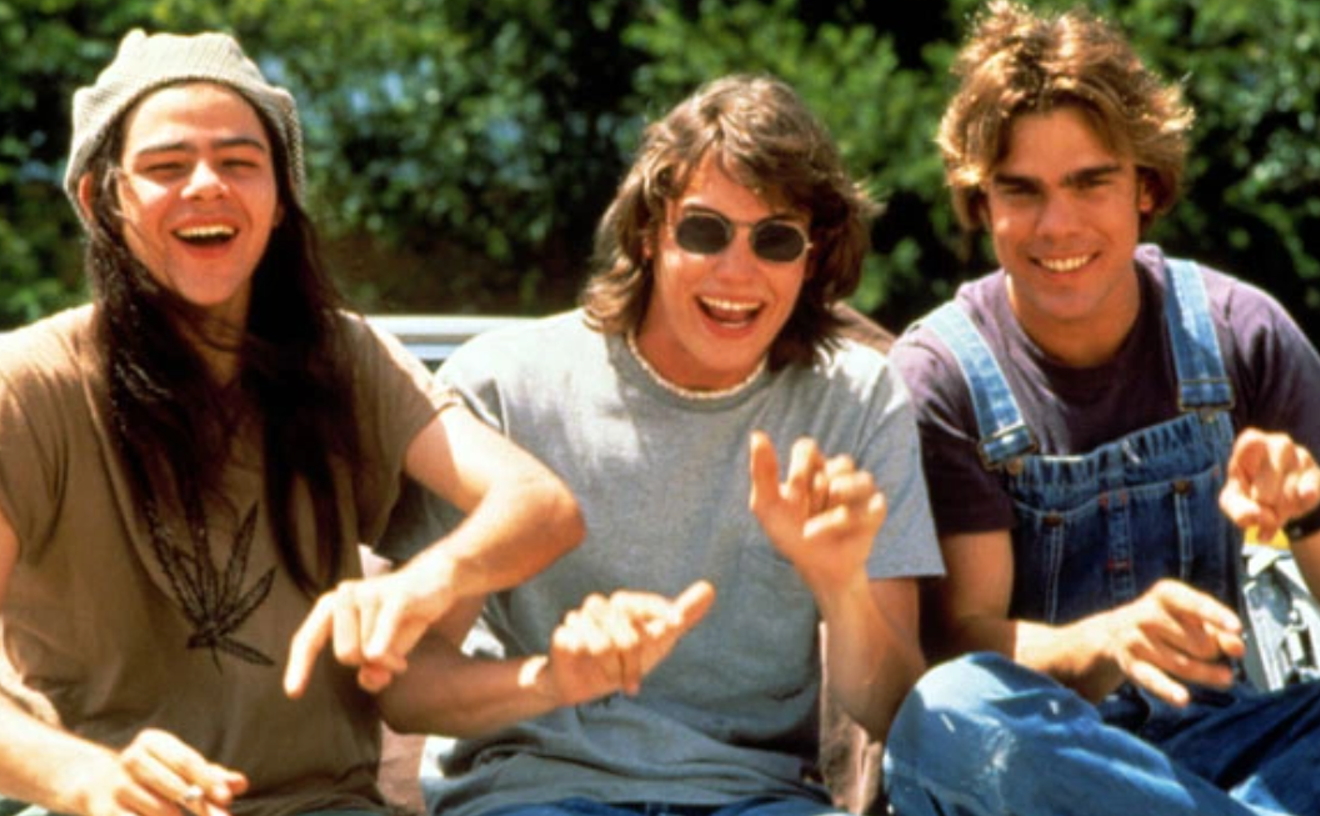After New York artists organized a "Nasty Women" exhibition, inspired by Donald Trump calling Hillary Clinton a "nasty women" during their final presidential debate, five local artists organized the "Nasty Women: Phoenix Unite" exhibition to protest a possible rollback of women's, LGBTQ, and immigrant rights.
When protesters gathered at the Arizona State Capitol in conjunction with the Women's March on Washington, the day after Trump was inaugurated, participants included a number of visual, literary, and performance artists who shared their experiences on social media.
Before he assumed office, reports surfaced alleging Trump plans to eliminate the National Endowment for the Arts and the National Endowment for the Humanities, as well as privatize the Corporation for Public Broadcasting.
So New Times reached out to several Valley artists with a question: Trump’s federal budget plans include cutting the National Endowment for the Arts (NEA) and National Endowment for the Humanities (NEH), as well as privatizing the Corporation for Public Broadcasting, according to several reports. As an artist, what's your reaction to the proposed cuts?
Their e-mailed responses, published below, reveal some significant concerns.

Rachel Bowditch participated in the January 21 Women's March in New York City.
Courtesy of Rachel Bowditch
Associate Professor, School of Film, Dance, and Theatre, at ASU
I stand in solidarity with all the women, men, and children who represented us at the Women's March on Washington and around the world. I attended the Women's March in New York City. It was a moving and powerful experience to hear the streets of New York City ring with the sound of "THIS IS WHAT DEMOCRACY LOOKS LIKE!" as well as waves of a unified voice swelling through the air. DT? FYI: this is what your next four years will look like. We are living in a moment where lies trump truth. Where the 1 percent of the 1 percent are being given the reins; where the swamp wasn’t drained, it was filled with swamp monsters. Every day it goes from bad to worse. Now, he is threatening to cut the NEA and the NEH.
1. I feel like I am living in the Twilight Zone.
2. I feel like I am living in the Twilight Zone.
3. I feel like I am living in the Twilight Zone.
4. I feel like I am repeating myself.
5. I feel like I am living in the Twilight Zone.
Yesterday, there was a thick fog hanging over New York City. The skyscrapers seemed to vanish into the fog — it feels like an apt metaphor for the current moment — where truth vanishes into lies; where reality is blurred; where the future feels so uncertain.
Audra Carlisle
Artist
There is no sense in defunding, and therefore devaluing, the arts and humanities besides making a point about how much they are valued in today's political climate. Judging by the numbers, cutting these programs is not going to make enough of a dent in the national budget to make a tangible difference. However, these cuts will have a direct impact on the creative class, and on the work being produced across the country.
The presentation of creative work as impractical, frivolous, and disconnected from the world at large is ignorant at best. Almost all of modern life is carefully designed and artistically driven because of the work of the creative class. Destroying what keeps them on their feet only serves to further alienate us, and those that support these programs and others— something I do not believe Trump can really afford to do.
Angel Castro
Founder, Halo Movement Collective
As an artist, this is a deep cut. As humans, this takes away our earliest form of expression. Art is at the center of all civilizations since history has been recorded. Artisans have always been part of the human hierarchy. Such proposed cuts would directly affect the livelihood of the arts. Self-funding is only sustainable to a certain extent and places a cap on the potential artists can reach and the resources we can allocate. I read a quote recently which is the simplest way I can address the issue "Cutting PBS support (0.012 percent of budget) to help balance the Federal budget is like deleting text files to make room on your 500G hard drive" — Neil DeGrasse Tyson.
These proposed cuts by Trump will do absolutely nothing but lower morale and tickle the issue of balancing the federal budget. From experience in our last economic recession, companies and corporations make cuts at the highest levels to find balance. Art is at the core of humanity; to cut art is to cut the foundation upon which we exist and express. With no core we cannot sustain ourselves. With no core we simply are but walking, working drones with no creative outlets.
Rosemarie Dombrowski
Poet Laureate, City of Phoenix
Given the new Secretary of Education’s complete lack of educational experience, as well as her lack of a clear plan for measuring student success (or providing a fair and equal education to all students), I’m concerned that assessment-driven curriculum will continue to proliferate, further reducing the chances for the re-emergence of the arts in the public schools, especially those that have been historically underfunded.
As for the NEA, the lack of federal money will undoubtedly diminish the reach of many artists – artists who, in my opinion, are the curators of social and cultural history. Without the narratives produced by artists across all demographics, which versions of truth will be accessible to the masses? Which will endure?
This kind of historical erasure harkens back to Soviet-era conditions, or, at the very least, early modern Europe, when the securing of patronage (or the possession of independent wealth) was a necessity for anyone desirous of “producing art.”
We all knew it was going to be grim, but this is starting to look cataclysmic.
Jake Friedman
Founder, Four Chambers Press
I'm always a little stunned when anyone suggests cutting to the arts. I think it's pretty safe to say that the arts have always received a fractional amount of spending compared to social security, or the military, or tax breaks, or other major programs of government, and so I'm like, this is stupid, this is ridiculous, who would actually want to cut funding to the arts?
A quick look down the lists of individuals and organizations who have received grants from the Phoenix Office of Arts and Culture, the Arizona Commission on the Arts, and Arizona Humanities reveals that the NEA and NEH's elimination would essentially dismember our local arts and culture scene — at the end of the day, I think this is a political tactic, a way to distract people from the issues while the administration and Congress advance other facets of their agenda and attack other issues.
I think the deeper issue underlying this possible legislation is art's relationship with conservative America. While there's obviously a potent strain of anti-intellectualism that's pervading the country, I think it could also be worth asking how we — as individual artists or intellectuals — could or could not have contributed to this divide in some way. Has art made itself inaccessible to the general public? Has art sequestered itself from the mainstream? Has art failed to reach out to and include certain communities?
How ironic is it that, in a time when we need nothing more than to find a way to come together, art creates a space where we can really connect with and identify each other as individual human beings — that this is what makes art so beautifully effective as a tool.
Rachel Goodwin
Artist
When contemplating that our newly appointed commander in chief has allegedly planned to rid the NEA, it disappoints me. It means that he does not believe our country needs the cultural diversity and expansiveness that the arts allow, which is absurd. From dance and music, to writing and art making, the benefits of arts to our social experience are overwhelming. Exposing oneself to different methods of creative expression in addition to being an active participant/educator plays a huge role in my own pursuits. With lack of national funding, opportunities for artists are going to become more difficult than ever to come to fruition, but it will not defeat us. Upon graduating in May with my MFA, I intend to enter work within the Phoenix community to share my passion of making and creative problem solving with others. I intend to work closely with my peers to continue dialogue into how we can immediately put into action our ideas for artist platforms. I intend to keep moving forward in pursuing my art practice. I will not give up. Art matters.
I do not own a television, which mitigates the level of adverts and nonsensical information filtered into my daily life. If the Corporation for Public Broadcasting becomes privatized, then it will affirm that we are living in a dictatorship. Where will legitimized news sources lie? What will the overall ethos be? What kind of propaganda will be utilized? My information comes predominantly from talking to people in real time and listening to intellectually challenging podcasts, which seem to be the last outlet of free speech within the media. I plan to keep it that way. We should all go out in nature more often and practice meditation regularly. A lot can be learned in stillness.
Ken Koshio
Performing Artist
Because my purpose is creating through music and the arts to bring about a more peaceful and harmonious communication, bridging the gap between society and different cultural backgrounds, art, and music becomes the heartbeat of survival, enabling us to survive under any conditions.
I am originally from Japan, and I am now proud to be a naturalized Japanese-American working closely with the Native Americans on the Hopi Nation. We are working together to bring a better understanding of how music from different cultural backgrounds can communicate a feeling of confidence and a more balanced mental condition. I can say this because I remember Executive Order #9066 signed on February 19, 1942, which was the order that called for the exclusion and internment of all Japanese-Americans living on the West Coast during World War II. Even though this was a sad story from 72 years ago, the animosities and misunderstandings have somewhat been healed through music and the arts. This is what I feel that I, and the Native Americans with whom I work, are so diligently striving for. This we feel is so important for the success of building a society to hold peace and a trustworthy relationship within this country and the rest of the world. Without this trust and unconditional peaceful communication through art and music, we will not be able to express who we are as a people without the freedom of expression and be able to support and hold a trustworthy relationship with the rest of the world on this planet. We must stop making ourselves and our expressions be suppressed through selfishness and division.
We need to keep on expressing our spirit of freedom through art and music, to respect individual and indigenous people to be comfortable and confident and to be able to express who we are instead of being controlled by mass communication.
Read on for responses from Douglas Miles, Ralph Remington, and Alberto Rios.
Douglas Miles
Artist; Founder, Apache Skateboards
Trump hates artists because it's been the artists and creatives in this country who have been most effective in ridiculing him as well as critiquing his exclusionary, xenophobic, and divisive platforms.
Paul Robeson said, “Artists are the gatekeepers of truth. We are civilization's radical voice.” Privatizing PBS, an educational channel, eliminating the NEA and the NEH, is a pathetic, futile attempt at silencing artists, creatives, and educators. They hope to stop critical thinking (learning via PBS) in media but can't because truth and time tell and has its own agenda.
Artists are already organizing, and many work outside these organizations. These cuts disguised as fiscal responsibility are merely attempts at discouraging artists and those supporting the arts. It won't work, because artists make art out out of pure need and the passion to create. The cuts will only incite massive creativity for the next four years.
Paul Mosier
Author
It's a recurring theme for conservatives to view with contempt the arts, to think that society and the government it elects has no place in providing for the support of arts that may have limited economic viability. This is bad news for art in many forms, from opera to ballet to classical orchestras and jazz ensembles, and poets, and many others. It's also bad news for those whose ability to experience art is limited by their economic condition. A society cannot consider itself great without great arts. Artists are key to economic revitalization, and the arts are the expression of the soul of a community. Privatization, and any other measures that make the existence, expression, and experience of the arts more about money will serve to bankrupt the soul of our communities.
Rembrandt Quiballo
Artist
This is ominous news and very much expected with the incoming administration. The arts have always been perceived as a bastion of progressive thought and goes against everything Trump feels he needs to stand for. It’s uncertain if he will actually go through with these cuts, but I think art is an easy target for Trump and would be an effective way for him to please his supporters on a surface level. Because funding for the arts is relatively minuscule and would have no real impact on reducing the federal budget. It’ll look good on his Twitter feed for a couple of hours.
It just makes it harder for artists to advance; however, we’re used to the struggle. This makes it more vital for DIY-type groups in the valley like Eye Lounge, Cut+Paste PHX, Four Chambers Press, Femme Fotale, or PHXSUX to continue to exist as independent culture producers. These advocates of creativity will continue to thrive in the vast cultural wasteland that a majority of the Phoenix Metro Area tends to be, regardless of what Trump enacts. I think this is what makes the Phoenix art community exceptional, in that it continues to thrive despite all the challenges we face locally and nationally. The people who work to create the scene do it for the love and the belief that art makes our lives better, and Trump has no effect on that.

Ralph Remington, Arts and Culture Deputy Director for the City of Tempe
Dave Wolf/Tempe Center for the Arts
Arts and Culture Deputy Director, City of Tempe
As a former Director of Theater and Musical Theater at the National Endowment for the Arts, I have seen how arts funding can positively transform lives and communities. I hope that President Trump will thoroughly examine the impact that drastic arts funding cuts would have on the communities that he serves. The arts saves lives. As a kid growing up in West Philly, it certainly saved mine.
Alberto Rios
Poet Laureate, State of Arizona
Cutting and destroying are the easiest things to do. But building an abiding human legacy, as the arts have done, is hard work in a complex world, without instruction or precedent. Cutting means the hard work will become the harder work, so that yet again the taxing burden on the existence of the artist rises as it has so many times throughout history. It is an old lesson with a familiar outcome — we quote the artists and survive the politicians.
Jaclyn Roessel
Founder, Grownup Navajo; Museum Professional
I am incredibly disappointed and outraged at the proposal to eliminate the NEA and the NEH agencies. Having been on the board of the Arizona Humanities, the local affiliate of the NEH, I have seen the power of the government dollars at work. From programs that create spaces for veterans to write and share as a way to quell the impacts of PTSD, to programs that bring people together from all backgrounds to discuss human experiences. I have listened to poets talk about their identity and scholars talk about race in America.
Working as both an artist and a museum professional, I have visited numerous museums in Arizona and across the country who receive funding from the NEA. These dollars have created intersections for experimentation in the arts while also creating of art in rural communities because of these funds. Our city of Phoenix has an amazing Public Arts programs that the Office of Phoenix Arts and Culture is able to maintain with the help of NEA funding.
Growing up on my reservation in northern Arizona, I watched Sesame Street incessantly and learned! The humanities and arts matter; they help us understand the importance of personhood and agency. In Diné (Navajo) teaching, we believe in honoring the responsibility we have to one another – we have a rich kinship system which not just tells us how we are related but we also understand, outside our Navajo community – as Bilá ashlaa’ or five-fingered people, we are connected to everyone. This is why I am so moved to protect these agencies which help make this work accessible. I firmly believe that many of the social issues our communities face are exacerbated by our inability to empathize with one another. The arts and programs that promote the humanities through vehicles like the Corporation for Public Broadcasting and the NEH, challenge us to look beyond ourselves. The elimination of the NEA and NEH and privatization of the Corporation for Public Broadcasting promises to irreparably damage our community's ability to engage a variety of voices in elevating our ability to see one another and the contributions we make to our society overall.























